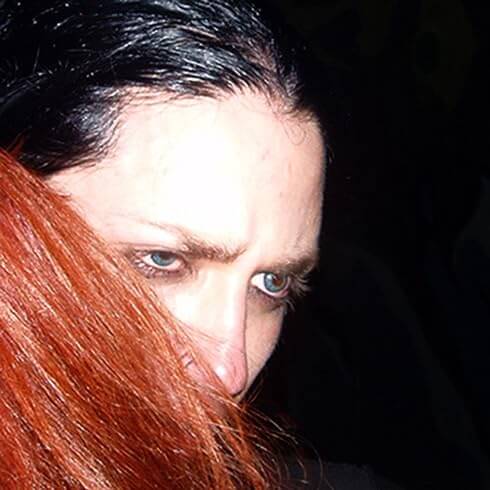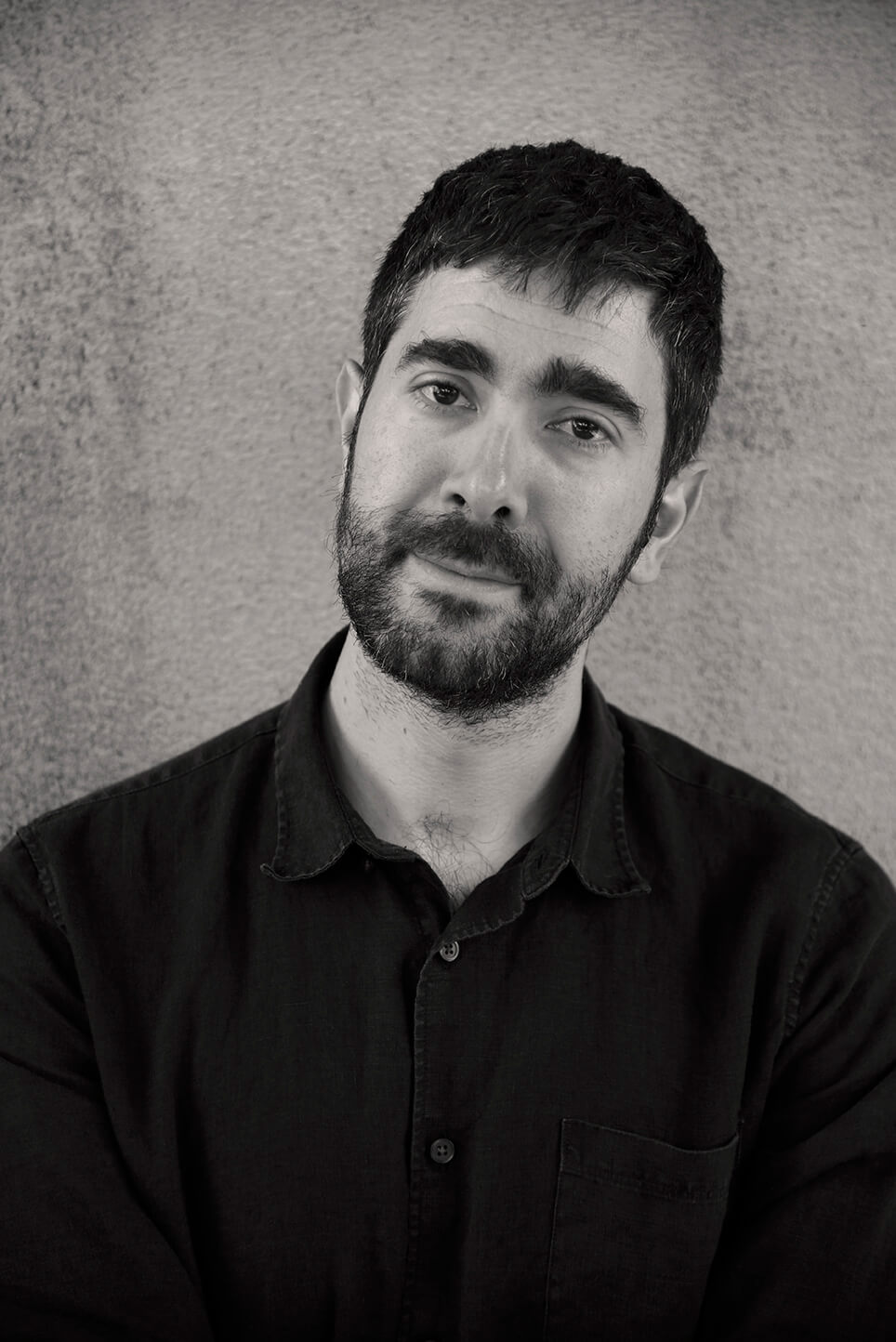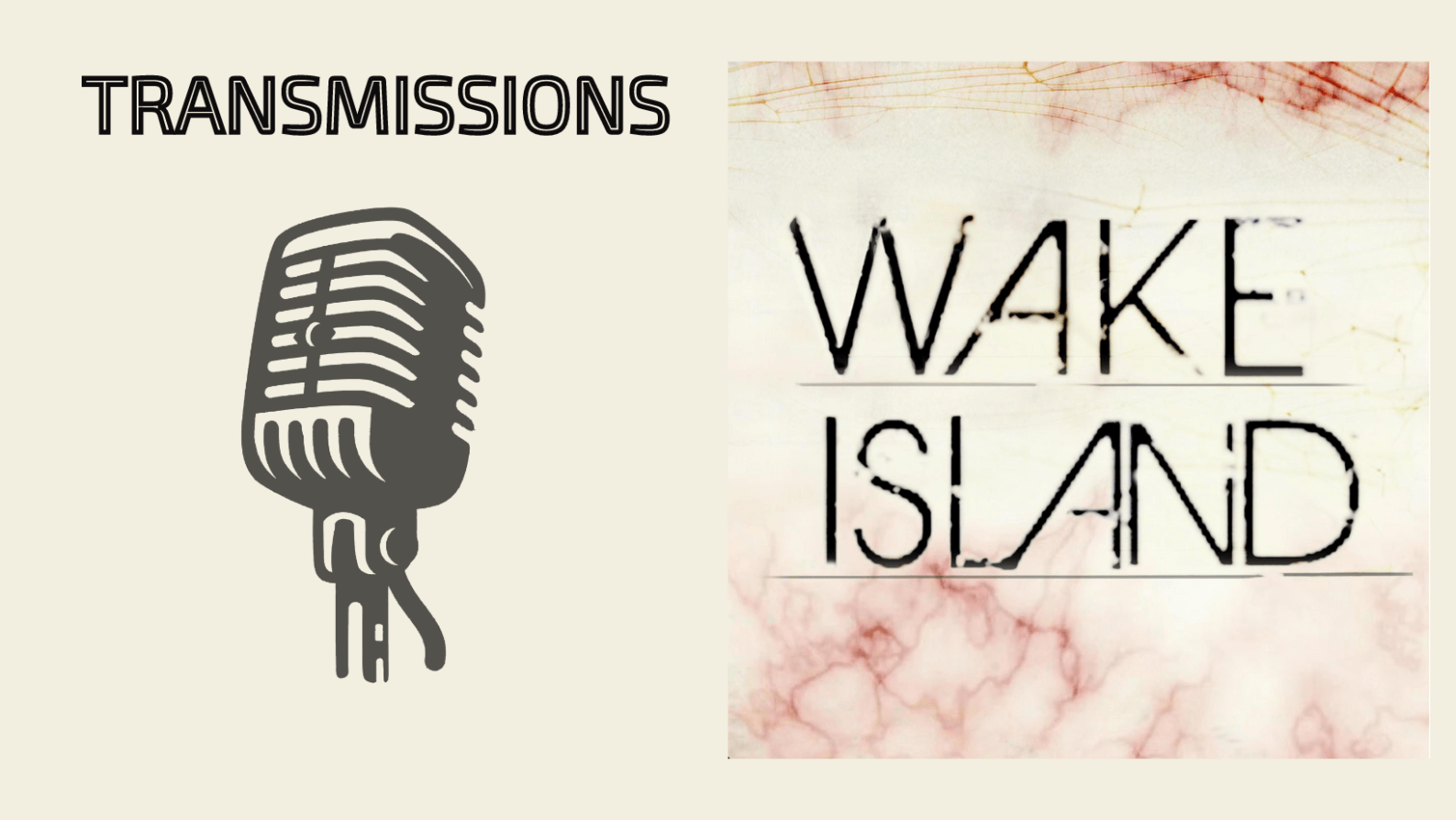Welcome to Transmissions, an interview feature in which X-R-A-Y profiles podcasts.
Paul Kwiatkowski is a photographer/writer based in New York City. His work includes: And Every Day Was Overcast / Eat Prey Drug / Ghost Guessed w/ Tom Griggs.

David Leo Rice is a Brooklyn-based author. His work includes the novels Angel House, The New House, and the Dodge City Trilogy, as well as the film anthology Children of the New Flesh and Drifter: Stories, named one of the “10 Must-Read Books of 2021” by the Southwest Review. The Berlin Wall, a novel, and The Squimbop Condition, a collection, are forthcoming in 2024. He’s online at www.raviddice.com.

Rebecca Gransden: How would you describe the podcast to someone who is unfamiliar with what you do?
Wake Island: We explore darkening societal undercurrents through an artist’s work, delving into its origins and relevance today. Our focus lies not in dissecting the art itself, but using it as a lens to discuss its context and influences and their relevance to the broader culture, whose nuances we try to tease out. We aim to articulate the significance of the final words written during a period marked by fears of encroaching totalitarianism, plague and apocalypse. We aim not to take any political stance but rather to reach a level of meta-politics, to consider how the political movements of our time make people feel on the level of dreams and fantasies, and how those feelings in turn influence our politics in bizarre and darkly exciting ways.
RG: Does the podcast have a mission or manifesto?
WI: At Wake Island, we focus on exploring how culture, history, and emotions transform when filtered through artifice. Additionally, we delve into the gothic nature of modern reality shaped by our reliance on systems that seem unable to either die or evolve, locked instead in an “unworkable equilibrium” that feels always on the verge of collapse without (so far) ever going over it. Or perhaps these systems collapsed long ago, but we are now unable to see the aftermath for what it is. This conundrum has created a shapeless present, diverting attention from reinvesting in the natural world or moving forward into a future that actually feels new. We love to engage our guests in discussions of the nature of nostalgia, seeking to probe its sources and contours without wallowing in it.
RG: How long has the podcast been in existence, and how have you seen it grow over that time?
WI: We’ve been around since 2020. Initially, during the pandemic’s onset, we were more open in our interactions. As life gradually resumed its normalcy and we became busier with work and family commitments, our scheduling became more selective – now we only record when the right opportunity arises, rather than keeping to the biweekly schedule we had before. Paul started the podcast on his own in 2020, and David came on, first as a guest and then as co-host, in 2021.
RG: Where did the idea for the podcast come from?
WI: We became disinterested in typical literary podcasts due to their predictable, formulaic dialogues. The writers we admire seldom appeared on these platforms, and we saw an opportunity to share their unique perspectives with the world in a new light, one that had less to do with their specific books and more to do with a larger perspective that might emerge from conversation. We use an author’s work as a point of departure, but always aim to get into uncharted territory.
Observing a disconcerting cultural shift in the 2010s and early 2020s, we sensed the importance of addressing prevailing negativity without adopting a polemical or abrasive tone. Exploring the underlying nuances and their connection to art felt crucial in broadening our worldview and striving to make contact with the present, however slippery it remains.
It saddened us to witness the spectacle of so much poetic and aesthetic effort to wrestle with contemporary culture being shoehorned into the narrow boundaries of political polarization and Twitter hand-wringing, so we felt compelled to build a space for conversation that went beyond this. We wanted to make space for a third affect–that of strangeness, luxuriance, deceit, and ambivalence–within a cultural sphere that seemed to push all considerations of any topic into the binary of “good” vs. “bad,” or “for” vs. “against.”
We discovered that discussing a topic indirectly, pinpointing its emanation point or when it starts dissolving into uncertainty, brings greater intensity. The best discussions often revolve around these two extremes. Taking inspiration from the artists and writers we love, we aim to play with the topics we discuss, rather than to simply promote or disavow them.
RG: How did you decide upon a title for the podcast?
Paul K: Initially I wanted a title that sounded tropical and vaguely bleak. Something drawn from a real place symbolizing finality. The inspiration also stemmed from a short story by J.G. Ballard, “My Dream of Flying to Wake Island” from his collection Terminal Beach. Anything Ballardian intrigues me – he’s come up on numerous episodes and his body of work and overall perspective have served as a mission statement for the show’s understanding of the dark beauty of the contemporary built world in all its precarity, violence, and mad potential.
RG: Are there any podcasts that influenced or encouraged you to start the project?
WI: Bret Easton Ellis’s interviewing style offers a unique and entertaining approach that feels as inspirational as it is entertaining.
Also Scott Carrier, an author and radio producer, remains a massive inspiration. His audio stories redefine the dramatic potential of the medium.
RG: What episode of the podcast would you recommend to someone who is new to what you do?
WI: Our recent two–parter with Jason Bahbak Mohaghegh, an incredibly versatile scholar who focuses on madness, ritual, ultra-violence, poetry, secrecy, and occult magic, drawing on Middle Eastern culture and lore.
RG: How do you go about selecting who to feature on each episode?
WI: We share similar reading tastes, but we each cover different ground. Sometimes, one of us will come across a book and recommend it to the other, and then we’ll reach out to the author. Other time, we’ll come upon a certain topic in discussion with one another that we want to discuss on the show, then look for an author who can tell us more about that topic.
Either way, prior to recording our discussions, we shape our intended talk in a shared doc, outlining the ideas we want to express and the questions we want to ask, though we always leave plenty of room for the actual conversation to take a different turn. We’ve found that the ideal level of preparation is when we have enough planned material that we never get stalled or lost, but not so much that we have to rein our guest in – we’d much rather follow the guest where they want to go, so that each episode is unique.
RG: If you are a writer, has the podcast impacted your writing life? and conversely, has a writerly disposition influenced the podcast?
WI: The podcast keeps the writing routine fresh. Speaking with dedicated authors makes the task of writing a book feel achievable. Despite the belief that reading is declining, we’re consistently amazed by the level of work being produced. There’s currently a publishing renaissance with authors pushing the boundaries of what can be achieved and expressed through this medium and a wide array of innovative independent presses pushing the medium forward even as the major commercial presses stall out. We’re proud to feature authors from presses like Apocalypse Party, Clash, and 11:11 and plan to continue doing so.
RG: Do you listen to podcasts?
WI: Yes.
RG: What is the best podcast out there at the moment, the one you are excited for when each new episode drops?
WI: The Bret Easton Ellis Podcast.
RG: What do you dislike about podcasts?
WI: We dislike podcasts where hosts monopolize discussions or come off too conversational and earnest. What bothers us most is podcasters discussing woke culture, either pro or con, while inadvertently letting it stifle their creativity, trapped in a cycle of complaining rather than pushing forward to do the kind of work they claim to value. Contrary to the fears that many podcasts put out there, expressing oneself isn’t being canceled—it’s become fashionable. In a way, we are actually living in a great moment for open debate and discussion, it’s just happening outside a mainstream that feels increasingly devoid of life.
RG: Who is your dream guest?
WI: Tom Ford. David Cronenberg. Adam Curtis.
RG: Is there a theme or subject you are burning to cover?
WI: Barbarism.
RG: Is there a podcast that doesn’t exist, but you wish did?
WI: That is the genesis of wanting to start Wake Island.
RG: For techheads, which single item of kit do you consider essential for the production of the podcast, and what would you say are the basics needed for those new to podcasting?
WI: Keep it simple. More equipment, more problems. We use Rode mics, which suit us very well.
RG: If someone would like to support independent podcasts, what are the best ways to do this?
WI: Buy us drinks. Give us money – the link to do so is in the show notes. Rate and review the show on Apple and Spotify. Send us dirty messages. Tell your friends.
RG: Looking back on the podcast, are there favorite episodes, episodes that stand out to you, or episodes that didn’t go as you would’ve liked?
WI: We’ve had a few stinkers. Initially, releasing episodes biweekly made Wake Island feel like a pit stop on authors’ virtual book tours. The pressure piled up without much motivation or payoff. Guests appeared disinterested, feeling obliged, and it made the experience a bummer.
On the other hand, we’ve had podcasts where, as it went along, we couldn’t believe how exciting it was to hear it take shape with the guest on the other end. Check out our talks with Jarett Kobek, James Pogue, and Matthew Specktor.
RG: What are your plans for the future?
WI: Death.
RG: If you liked that, you may also like this. Are there any podcasts on a similar wavelength to your own that you would recommend to a listener who appreciates what you do?
WI: Horror Vanguard

